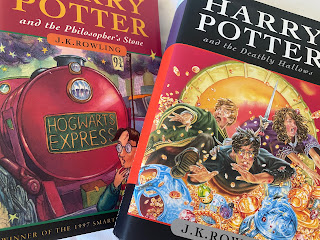Come on, books are brilliant at all sorts of things. Better than films, better than dreams and certainly better than real life. Or have I got that wrong?
Anyway. Sometimes I'm lying on the grass and something hits me - a kind of "so that's why books are so amazing!"
To celebrate these occasional moments and to share them out to see whether you agree, I'm going to collect them as they happen. Here's the first inspired thought...
Books are best at.... retrospective realisation
Lovely phrase, eh? I just made it up. I think.
This is that moment when you have to cast your mind back - way back - to the beginning of the novel even - and only then does something (everything?!?) make sense.
It's a wonderful thing. You may have had a an eight-hour read and then something just twigs - ah, of course. And it was planted at the back of your mind without you even realising it, ages, ages long ago.
When it fires, you get new understanding - a buried brain cell electrifying its neighbours - and if it works it can trigger everything in the book to repeat itself for you like a wriggling chain - causing a deep bell that tolls from far away, but loudly, and brings you closer.
Sometimes these are keys to the whole arc of the plot - although that's a risk if it isn't reinforced pretty clearly.
Some books use this technique to totally reverse your interpretation of everything that went before (have you read McEwan's Atonement?)
More commonly, it's a repeat of a scene with more detail this time round - oh, of course, you say as the first scene continues and we realise the full import. (David Nicholls' One Day has such a good version of that.)
Sometimes it's a tiny clue to something that isn't absolutely vital, but which you've seen and it's like a private understanding, a quiet nod to the author who, just as quietly nods back.
As an example of that, I've got JK Rowling's Harry Potter and the Deathly Hallows (and not the Snape plot, no.)
When the main trio go into the room of Regulus Black, early on, Harry finds a photograph of himself as a one-year-old. He's flying a baby's broomstick. It's so meaningful to him, partly because of the family he can see enjoying their first Christmas with the toddler Harry.
But there's also a great moment of realisation.
Remember the first book? That's a 10 years of publication gap. Probably a few years for you as a reader.
Remember Harry's first broomstick lesson? Ever wonder why he was just amazingly good at it even though he'd never done it before .... ah, of course. And it makes you feel like he was given something special by the parents he never knew.
And there's that frisson of reading pleasure that's sort of like finding the hidden key to a treasure box.
Number 2 available soon.

Comments
Post a Comment